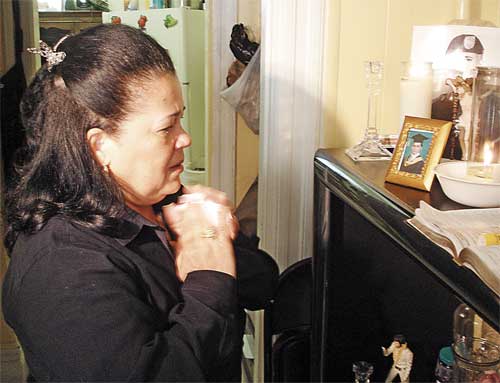By Jeremy Walsh
One year after former Corona soldier Alex Jimenez disappeared on patrol in Iraq, his mother holds out hope he will be found, while Congress and the Bush administration continue battling over legal wiretapping hurdles intelligence officials have blamed for delaying search efforts.
Spc. Jimenez, 25, and his comrades were ambushed while on guard duty in Iraq on May 12, 2007. Four soldiers were killed while Jimenez and two others were taken hostage. The body of one of the captives was later recovered, but Jimenez remains missing.
Maria Duran, Jimenez's mother, still believes the Army will find her son.
“They send me letters,” she said. “They're searching.”
But she said no new leads have emerged since Jimenez's machine gun was discovered in October 2007 among a stockpile of weapons seized near the site of the ambush 20 miles from Baghdad.
Duran said she plans to pass the anniversary itself at home with friends. But on May 10, she will attend a service in Lawrence, Mass., where her son lived before he was deployed. A prayer vigil will also be held at Our Lady of Sorrows Church May 17, she said.
Jimenez's disappearance was at the center of a debate over amending the Foreign Intelligence Surveillance Act, a 1978 law Republican lawmakers contend was not written to handle the complexities of current technology.
In October 2007, the director of national intelligence told Congress the search for Jimenez was delayed up to nine hours as officials argued whether monitoring certain cell phone conversations would require special authorization from the attorney general.
Since that time, the House and U.S. Senate have taken turns altering an amendment to FISA.
The new House bill, passed on March 18, allows for emergency cell phone surveillance of people to go forward immediately, but requires the government to file with the Supreme Court within seven days, according to documents provided by U.S. House Speaker Nancy Pelosi (D-Calif). The court would then have 30 days to rule on the surveillance.
The bill was immediately denounced by Attorney General Michael Mukasey and Director of National Intelligence Mike McConnell, who maintained the amended bill was inadequate because it would require court approval for cell phone wiretaps.
Back in Corona, Duran said she thought the government should have expanded wiretapping abilities.
“If they had that before, I think this wouldn't happen like it happened to them,” she said. “It took too many hours.”
But Duran said she also believes the United States should end the war in Iraq and bring its soldiers home.
“The war is a lot of problems everywhere,” she said. “They can't fix anything in that war.”
Reach reporter Jeremy Walsh by e-mail at jwalsh@timesledger.com or by phone at 718-229-0300, Ext. 154.


































